RDM Archives
Q4 2006
iPhone RSS Version
Free iTunes Links
iTunes RSS Feeds
Other iTunes Content
Netflix

Myth 9 & 10: iPhone Myth, Panic, & Threat
Here are two iPhone myths rolled together. The first stated that the iPod no longer matter because mobile phones now have the capacity to play MP3s; the second is that Apple would either not be able to make its own phone, or would be stymied by the problem of not being able to call it the “iPhone.”
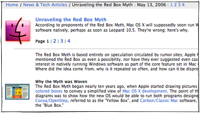
Rumors of Apple adding the native ability to run Windows applications in Mac OS X have repeatedly bobbed to the surface of rumor sites over the last decade, but in 2006, the Red Box fantasy belonged to Mark Stephens, writing under the alias Robert X Cringely. Stephens confused Apple's simple BootCamp tool with a comprehensive new Windows strategy by Apple to add Windows compatibility and then eventually replace Mac OS X with Windows Vista.

How could the iPod Killer have failed so miserably when everything else Microsoft has touched has turned to gold? The answer, of course, is the Xbox Success Myth. Microsoft's game console has long been held up as example of the company's steamroller success, but it simply isn't.
By presenting the Xbox as a raging success, Microsoft appears to have more clout than it actually does. It also serves to overshadow its more obvious and embarrassing failures, including WinCE, smartphones, PDAs, tablets, and Origami handheld devices.

Myth 6: Microsoft's iPod Killer Myth
What could overshadow the interplay between two myths simultaneously arguing that iTunes was both a power mad monopolistic monster and a whimpering failure? The Microsoft iPod-Killer Myth of course!
In 2006, Microsoft realized that the real problem with its PlaysForSure had nothing to do with its abusive DRM and a business model reliant on subscription music sales. Instead, its failure was determined to all be the fault of incompetent partners like Napster and Yahoo! The solution: abandon all of its store and device partners to introduce a single new product that would be sold and supported exactly like Apple’s iPod.

Myth 5: The iTunes Collapse Myth
Earlier this month, Andrew Orlowski of the Register, already credited with myth number one, launched a new attack on Apple's music sales through iTunes. He announced that the service had "experienced a collapse in sales revenues this year," basing the statement on numbers pulled from a Forrester Research study.

Myth 4: The iTunes Monopoly Myth
This myth is of the self-canceling type. From one side of their mouth, analysts of all stripes bemoan Apple's supposed monopoly hold on digital downloads. The same analysts also pretend to believe that iTunes doesn't matter because only a minority of people are even buying online music, particularly in comparison to the established market for CDs. So which is it?
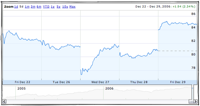
Myth 3: Apple Options Scandal and Delisting Panic
This myth was based on reports Apple itself issued in this summer, stating that irregularities were found in stock options granted to certain Apple employees between 1997 and 2001. The internal audit presented the problem as an issue Apple was investigating.

Myth 2: Greenpeace Toxic Apple Panic
Greenpeace began a new fundraising campaign for 2006, specifically targeting Mac users. Why Macs? Because Mac users are typically more affluent and more likely to be interested in environmental issues. The campaign was the brainchild of Iza Kruszewska, a consultant associated with the Silicon Valley Toxics Coalition. The SVTC had earlier determined Mac users to be a good target for donation campaigning, and drew up a custom Apple logo with a worm on handouts that called the iPod “toxic trash.”

Top 10 Apple Myths of 2006: Osborne Effect
The Register's Osborne Effect Panic. This myth got started six months early. In June 2005, after Apple announced plans to move the Mac to Intel processors, Andrew Orlowski of the Register reported that Apple would face a "painful migration," and asked, "who in their right minds would buy a Power-based Mac now, or in the next eighteen months?"

Apple's iPhone: Disrupting Mobile Service
New hardware isn't the only way Apple can shake things up in the mobile industry. The company has the ability to disrupt the entire distribution channel, which is currently controlled by cellular service providers.
The control maintained by service providers has slowed the advance of hardware features and the emergence of new competition for service. Here’s how Apple is poised to disrupt that status quo.

No official details of Apple's iPhone have yet been released, not even its actual name. However, Apple's mobile phone efforts are not just based on the speculative Mac rumor sites known for inventing a large portion of their own content and publishing it as "exclusive information from reliable sources."
Rachel Rosmarin, a technology reporter for Forbes, has written about Apple's mobile efforts, citing both credible sources and noise from such vacuous blurb experts as Rob Enderle. There isn't a lot of known facts yet, but that doesn't mean there are no clues to examine.

iPod, iPhone, iTV: How Apple's New Platform Works
Apple's iPod is a runaway hit, but will any of that success translate into different product categories? Some analysts seem to think it won't, but there are significant reasons why Apple is poised to repeat the same iPod success in new arenas. It has little to do with music playback, and instead relates to the integrated network of services Apple has built to support the iPod.

iPod, iPhone, iTV: Why Apple's New Platform Works
Apple's strategy for a new set of consumer electronics devices seems to be beyond the grasp of most industry analysts. That should really come as no surprise, because they don't seem to understand what made the iPod a success over the last five years either. Since its release, analysts have been falling all over themselves to identify the next “iPod killer.” They still throw out the phrase every time Sony releases a new version of a Walkman branded phone or Microsoft renames its latest version of Janus DRM, to suggest that the iPod is on the verge of being eclipsed.

The iTunes Vendor Lock In Myth
According to proponents of this myth, Apple's iTunes is unfairly locking Microsoft, Real, and Sony out of the market for digital music by blocking rivals’ efforts to put their own DRM systems on iPods, and is using vendor lock in to distort the market for online music and players. They're wrong, here's why.

The Register’s 'Collapsing iTunes Store' Myth
Andrew Orlowski of the Register recently launched an opinion piece that cast fear, uncertainty, and doubt upon music sales through iTunes, announcing that the service has "experienced a collapse in sales revenues this year."
Orlowski based his ideas on numbers pulled from a Forrester research study, but interestingly, did not seek comment from Apple. While Forrester's research was based on a limited number of customer's credit card records, Apple has a bit tighter grasp on how much it actually sells through iTunes.
Why didn't Orlowski ask Apple for comment on the data? Because he knew the numbers he extracted to create this new myth didn’t really paint the picture he implied they did; in fact, his article even pointed out that Forrester's Josh Bernoff "warned against extrapolating too much from the figures."

1990-1995: Microsoft's Yellow Road to Cairo
Automatic PC sales of DOS rapidly made Microsoft one of the largest software companies of the 80s. As its market power increased, it gained a reputation as a vendor with staying power. Nobody wanted to invest in the software of a company that might go out of business.
Microsoft used its new clout to introduce a product vision called Cairo in 1991; it disrupted development and marginalized competition throughout the next decade. The tactic worked so well that Microsoft repeated it in the following decade as Longhorn. Here's how it happened, and why Microsoft won't be able to repeat the same fraud again.

Device Problems In Search of a Solution
A variety of consumer electronics devices present problems in search of a solution. Inconsistent user interfaces are key problem, but so is overall stability and the ability to painlessly sync with computers and networks.
Increasingly, devices store information that needs to be kept in sync, including calendar, contacts, and notes. Others access networks for content, including media downloads and software using web browsers and specialized web services. Nearly all of them need updates of some sort.
Other device issues deal with digital media, including cameras and music and movie playback devices. With the DRM protecting DVDs, how do users get their movies to work on a portable player? How does music get from a computer to a car stereo system to a mobile device?

Newton Lessons for Apple's New Platform
Apple’s press releases all end with the phrase “Apple ignited the personal computer revolution in the 1970s with the Apple II and reinvented the personal computer in the 1980s with the Macintosh.” Today, Apple is building a new platform, and applying lessons it learned from the 90s.
During that nearly forgotten epoch of upheaval and crisis, Apple tried to launch the Newton as a new platform, although its subsequent failure in the marketplace didn’t earn it a mention in Apple’s press release blurb.
The Newton wasn’t just a new gadget, it was intended to be a diverse platform. Like the Macintosh from the prior decade, the Newton started as one product, and intended to branch out into a range of systems.

iPod, iPhone, iTV: Apple's New Platform
Apple's unfolding iPod strategy is so clear and obvious that it's hard to understand why the pundits are so confused. They seem to think that Apple has no plan, and is simply poking in random directions. However, Apple quite pointedly does have a clear direction for all the products it has shipped, and that plan figures into what Apple will be releasing next year. That plan bears some resemblance to the introduction of the original Macintosh, and what that machine did to improve computing back in the 80's. Here’s a look at why.

Apple iPhone Rumors Off the Hook
In an interesting turn of events, a product that Apple hasn't even announced is currently earning more attention in the press than Microsoft's ultra-hyped, astroturfed, press-blitzed iPod Killer. In fact, Apple's still unannounced iPhone has rocketed the company's market valuation to an all time high, meaning that Apple has made more from silence than Microsoft has earned in actual sales of its new player.

Vaporware: Why Apple Doesn't Blog
As customers, we all want to know what's going to happen in the future, but we will also turn around and beat developers with the very information they share with us. One of the terms we hit them with is, of course, vaporware.

Looking for good news online? A new website promises to offer "news you can trust."

Apple's Billion Dollar Patent Bluster
It has been widely reported that Apple secured a patent worth a "billion dollars." According to a patent attorney involved in the issue, Apple will be "after every phone company, film maker, computer maker and video producer to pay royalties on every download of not just music but also movies and videos." The good news is that all the news reports were based on misleading hyperbole; the sole source of the flurry of articles about the billion dollar patent was a press release issued by the same patent attorney who represented the patent, and stood to gain the most from a wild spin on its actual valuation.

Bill Gates for President? No Thanks.
Dilbert cartoonist Scott Adams recently blogged that America needs an atheist and rational thinker for president, and he’s picked Bill Gates. The idea has become a popular subject in technical circles, which are commonly irreligious and tend to be more socially liberal. But as they say: be careful what you wish for, you might get it.

iPod vs Zune: Microsoft's Slippery Astroturf
iPod vs Zune: A Buyer's Guide focused on the usability and features offered by the iPod and Zune. Finding reliable information tends to be difficult because facts are often overshadowed by marketing fluff and spin.
Apple’s iPod has been so heavily marketed that it has become one of the best known brands, usurping the position of Sony’s Walkman. Microsoft is working hard to get attention for the Zune in a crowded market. When push comes to shove, Microsoft has no problem fighting dirty. Here’s a look at its tricks.
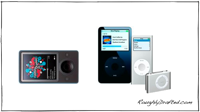
I've written several articles about Microsoft's new Zune MP3 player. A number of readers have asked me to do a direct comparison with the iPod. Here it is! Microsoft's Zune and the 30 GB iPod both have the same capacity and price tag. Even the cost of accessories are all identical. So here, I'll go beyond the specs and present a number of real world factors that define which player is a better buy.

Platform Crisis: The Lazy Dinosaur
Throughout the early 90s, Apple lacked a clear direction for delivering new technology. The company was certainly not out of ideas; it just wasn’t focused on turning them into new, marketable products. Apple was rich, and it was making significant revenues from high margin sales of its Macintosh computers, the only affordable, mainstream graphic workstations available. In 1990, Apple was positioned on top of the world, with 9% of the market for personal computers, a clear lock on many of the most profitable market segments, and increasing sales and market share.

Platform Crisis: The Tentacles of Legacy
While Apple appeared to do everything wrong throughout the early 90s, Microsoft appeared to do everything right. On the surface, it looked like Microsoft was starting out with clean design that allowed it to offer features Apple was still struggling to deliver, including memory protection and preemptive multitasking.

The Secrets of Pink, Taligent and Copland
Apple pitched three foul balls with Pink, Taligent, and Copland, only to then turn around and embrace a future it had worked so hard to compete against. The rest of the tech industry, scarred from the tumultuous Unix Wars, snubbed a perfect opportunity to benefit from millions of dollars worth of free and open technology, and instead spent a decade locked in the proprietary chains of isolationist development. Here’s how it happened.

Apple and Microsoft: Platform Crisis Meltdown
In the early 90s, Apple's Mac platform faced a meltdown as its Mac System Software aged and began to demand a clean slate redesign or massive overhaul. Microsoft found problems of its own in building both a Mac like environment for the DOS PC, and in delivering Windows NT as an entirely new operating system.
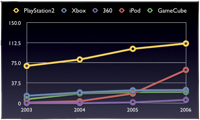
The Next Generation Game Consoles
The previous article outlined how Sony’s PlayStation 2 maintained a distant lead in the last generation of game consoles. What's different this time around? There are four primary factors that will determine the winner in the new generation of consoles. Here’s a look at the obvious differentiators between Sony’s PlayStation 3, Microsoft’s Xbox 360, and Nintento’s Wii, and how each company plays out a unique strategy in the bid to sell the most consoles.

PlayStation 3 vs. Xbox 360 vs. Nintendo Wii
The Sony PlayStation 3 and Nintendo Wii both jumped into the game console ring this weekend to compete against Microsoft's Xbox 360. Who is going to win?
Everyone's watching to see how this battle plays out, because each company is pursuing a very different strategy. Sony and Microsoft are gunning for pure performance systems, while Nintendo is shooting at fun, playable games that rely more on its unique controllers than impressive graphics hardware. The consoles' prices follow the features and product strategy of each company.

Leopard vs Vista 5: Development Challenges
Apple's Mac OS X Leopard and Microsoft's Vista follow different strategies in their prerelease marketing, product positioning, and market positioning, and integration. Here's how both differ in development issues.
The Difference of Development. One of the Notable Lessons presented in The Rise and Fall of Platforms is that the ideal way to develop popular software products is to ship early and often, making regular and progressive updates.

Leopard vs Vista 4: Naked Sales
Apple's Mac OS X Leopard and Microsoft's Vista follow different strategies in their prerelease marketing, product positioning, and market positioning. Here's a look at how both differ in product integration.
PCs Without Windows. Of course, it is technically possible to build a PC without having to buy a copy of Windows, but that doesn’t help users planning to actually run any mainstream applications, from PC games to Microsoft Office or Apple's iTunes.
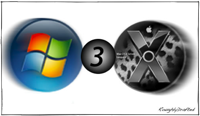
Leopard vs Vista 3: A Risk Strategy
It's tricky to directly compare Apple's Mac OS X Leopard and Microsoft's Vista, because the two products will be sold to very different markets in different ways. Here's a look at how both differ in strategic market positioning.
A RISK Strategy. PC enthusiasts like to scoff at the market share of Macs in comparison to worldwide computer sales. They view the worldwide PC market like a simple board game of Risk, where market leaders Dell and HP have more armies scattered over more territories, and Apple only has armies placed in a few.
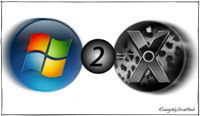
Leopard vs Vista 2: The Indirect Choice
It's tricky to directly compare Apple's Mac OS X Leopard and Microsoft's Vista, because the two products will be sold to very different markets in different ways. Here's a look at how both differ as products in the marketplace.
The Indirect Choice. Apple is strongest where Microsoft is weakest, and vice versa. Despite the intense interest in pitting Apple against Microsoft, Leopard and Vista simply aren't direct competitors.

Leopard vs Vista 1: Prerelease Marketing
It's tricky to directly compare Apple's Mac OS X Leopard and Microsoft's Vista, because the two products will be sold to very different markets in different ways. Here's a look at how both differ in their prerelease marketing.
The biggest hurdle in directly comparing Mac OS X Leopard against Windows Vista is that Apple and Microsoft have very different marketing strategies, particularly when it comes to prerelease software. Why is Apple so Secretive? described this in greater detail.

The Two Faced Monster Inside Zune
The Danger of DRM described the world before DRM and the complications that killed a decade of digital products prior to the iPod. It also introduced the new god Microsoft hoped would take over the digital universe: Janus.
The Watchful Eyes of Janus. Microsoft worked with media producers to design a comprehensive technology framework and DRM system named after Janus, the Roman god of beginnings and endings and the namesake of January, who was portrayed with two faces that looked both into the past and into the future.
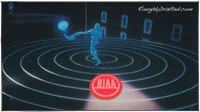
The market for digital music was repressed for nearly a decade prior to the arrival of Apple's iPod. Here's why digital music languished for so long, how Apple was able to build a digital business, and why rivals are struggling to turn back the clock and return digital downloads into a legal black hole of onerous restrictions.

Strike 3: Why Zune will Bomb this Winter
With so much failure already under its belt in the consumer electronics arena, Microsoft certainly hopes its new iPod Killer will make a strong showing this holiday season. Still, analysts aren't afraid to articulate exactly why they think the Zune will fail. The Microsoft iPod-Killer Myth already outlined why Microsoft's overall online media strategy has tanked so far, but the Zune faces three additional strikes this winter that will prevent it from making any headway in its goal to unseat the iPod.

The Digg Fraud Campaign Behind Zune
A recent Digg blog campaign sought to credit Microsoft with an early lead in using its Xbox 360 against Apple’s iTunes, iPod, and the forthcoming iTV in rival efforts to sell movies online--or in Microsoft’s case, to sell exploding media rentals. However, the story failed to mention that Microsoft has only sold 6 million XBox 360s in the last year, and most these require a hard drive upgrade in order to download movies. Digg users fell for the story and it was widely propagated through the blogosphere as a news item. Is it possible that anonymous blogs, popping out of nowhere without any history, might lack credibility and have ulterior motives?

As the 90's closed, Apple began unlocking the same direct sales efficiencies Dell had pioneered in the 90’s. Direct sales to consumers using the web allowed Apple to defend itself from lost Mac sales through retailers who were increasingly disinterested in selling Apple’s products.
As noted in Apple's Retail Challenge, many computer retailers were seeking to sell their own store brand PCs in order to earn both retail and manufacturing profits. Without direct control over its own retail sales, Apple simply couldn't compete with instant eWaste PCs.

By the early 90s, Apple's problem in selling its technology was already obvious. Computer sales were moving mainstream, out of specialized computer stores and into general retail. Stores such as ComputerLand, which had sold a large segment of PCs during the 80’s, were falling out of fashion and being eaten up by big box retailers who offered a larger selection. They also offered lower prices, and along with that, little assistance for consumers.

An accidental discovery that turned out to be key to Apple's recovery was presented in Why Apple Bounced Back. While critically important, it wasn't the only way the new Apple revitalized its Mac platform. Another contributing factor to the company's rebound involved Apple’s learning how to effectively sell its products. Apple's unique Mac required a new sales strategy; the ones used by PC makers weren't going to work.

Why Apple Failed promised to reveal an accidental discovery that was key to Apple's recovery. The great minds of Slashdot took various guesses over the weekend, but here's the real reason Apple was able to create new growth in the Mac platform.

Why Apple Failed challenged the commonly held idea that Apple's troubles throughout the 90's were tied to its small share of the overall market. Instead, it presented PC market share as a red herring the company's executives ineffectually chased after in efforts to become more like other PC makers--or alternatively, like Microsoft--while the real solution evaded their grasp.

Apple's recent quarterly earnings report blew past all expectations. More importantly, dramatic unit sales growth shows the company is executing a working strategy for building the Mac platform. That raises the obvious question: why has Apple's market share historically been so low, and why did Apple fail to make any progress in the 1990's?
Here's a look at why Apple's platform fell into crisis, and why the solutions proscribed by analysts didn't work. A follow up article will describe how Apple turned its fortunes around, and why the company is now poised make further gains.

Ten More Myths of Zune: Part 2
Microsoft certainly built a reputation for cleaning up the markets it chose to enter. However, as pointed out in The Microsoft Invincibility Myth, those past successes have been limited to software markets tied to the company’s monopoly position with Windows. Microsoft's prior success with Windows conspicuously avoided direct competition, leveraged price advantages, and blazed new trails into virgin markets. None of those factors will apply to the Zune.

What’s more fun than dissecting the overwrought failures of big dumb companies whose marketers ineffectually tried to put a price tag on cool? Doing it in real time, as it happens!
Ten iPod vs. Zune Myths took apart the marketing spin attached to Microsoft’s upcoming iPod Killer, but there’s plenty left to examine. Here’s a look at the whimpers of jilted executives, painful marketing drivel and fan speak, the geeky in-jokes, as well as the market realities and technical problems facing everyone’s favorite iPod Killer.

1990-1995: Planting Software Seeds
As a software company, Microsoft was only interested in selling licenses. Unlike Apple, Microsoft's profits were never directly tied to hardware profit margins. Microsoft's strategies aimed to widely spread the company’s software seeds on cheap, commodity hardware built by others.
Of course, cheap is a relative word. In 1990, a typical DOS PC cost around $2000. It offered a 386/16 MHz processor with 2 MB RAM, 256 color VGA graphics, and an optional mouse for use with the brand new Windows 3.0. Microsoft sold Windows 3.0, and the required DOS, for $200, or around 10% of the cost of the hardware.

1990-1995: Why the World Went Windows
The reason Apple's Macintosh survived into the 90's--escaping the fate of a variety of other unique platforms that were slaughtered by commodity PCs--was largely because of the tight integration Apple could provide between its hardware and software. Apple wasn't primarily selling RAM chips, a processor, and an OS; instead, Apple was offering a richly engineered and consistent experience. Smaller competitors, from Commodore to Atari, couldn't match the enormous development efforts Apple was investing in its platform. Microsoft employed the same principle of integration in its software offerings. Rather than seeking to build an integrated computer solution like Apple, Microsoft assembled a series of integrated software platforms that created networks of added value for users.

1990-1995: Apple vs. Microsoft in the Enterprise
Apple's distant lead in graphical computing began eroding quickly in the early 1990's. Microsoft worked to improve its DOS based Window 3.0 while it also made incremental progress in developing the entirely new Windows NT operating system. During The Rise of Windows, Apple merely entrenched in a rut of announced initiatives that failed to decisively deliver real progress or marketable products. While Microsoft looked for new markets and targeted business users in particular, Apple seemed content to rely on its existing, established share of specific niche markets that offered large profit margins.

The Secret Failures of Microsoft
Why Microsoft Can’t Compete With iTunes examined Microsoft’s past success in software development, and demonstrated why its past practices won’t be of any help in expanding into the consumer electronics and digital media download business. While the mainstream media is conspicuously quiet on Microsoft’s track record in consumer electronics, I’m more than willing to share!

Why Microsoft Can't Compete With iTunes
After reading Why Apple Will Change TV and the supporting Five Ways Why Apple Will Change TV, you might be left wondering why Microsoft won't simply beat Apple to the punch in delivering the future of the television. Here's the secret answers that expose a series of myths concerning Microsoft’s ability to own new markets, why its monopoly position won't be of any help, and why the company's consumer retail strategies aren't working.

Five Ways Apple Will Change TV: 5
Previous articles looked at how the iTV is positioned to add value to on-demand commercial content, users' own personal content, a variety of alternative content, and interactive content. What other kind of content is there? #5: Original Content
For an encore, Apple will begin creating its own content, commissioning original programming by acting as a label and studio. Think I'm exaggerating or speculating beyond reason? Consider the following facts.

Five Ways Apple Will Change TV: 4
Previous articles looked at how the iTV is positioned to add value to on-demand commercial content, users' own personal content, and a variety of alternative content. What other kind of content is there? #4: Interactive Content

Five Ways Apple Will Change TV: 3
The previous two articles looked at how the iTV is positioned to add value to on-demand commercial content and users' own personal content. What other kind of content is there? #3: Alternative Content

Five Ways Apple Will Change TV: 2
The previous article considered how Apple is pioneering delivery of on-demand commercial content, in particular music, movies and television programming. Apple also has investments in the production of that content, with pro software tools such as Final Cut Pro and Logic, as well as hardware engineered for audio and video production work, from the Mac Pro to the Xserve RAID. #2: Personal Content

Five Ways Apple Will Change TV: 1
Why Apple Will Change TV presented similarities between the iPod and iTV, and introduced how Apple is poised to add value to existing content using the iTV in much the same way that the iPod added value to CD and MP3 music collections. Here's the first and most obvious of Five Ways Apple Will Change Your TV - #1: On-Demand Content

Steve Jobs described the iTV as Apple's entry into the living room, as if it were a strategic move in a larger game plan. But with several wireless TV extenders already on the market, why will Apple's be any different?
One could have asked the same question of the iPod in 2001, when there was a similar variety of music players already available. Early reviews suggested Apple's product was simply nothing new, that it just had a bigger price tag. Why did the iPod clean up the market?
By Quarter: Newest Articles | Q2 2007 | Q1 2007 | Q4 2006 | Q3 2006 | Q2 2006 - 2004 | tiexp 2001
